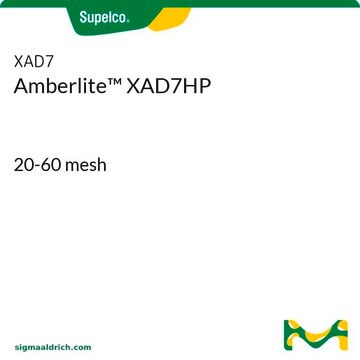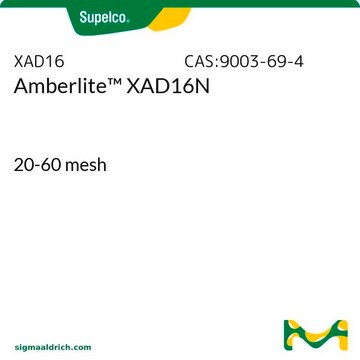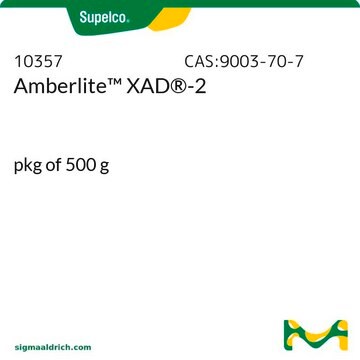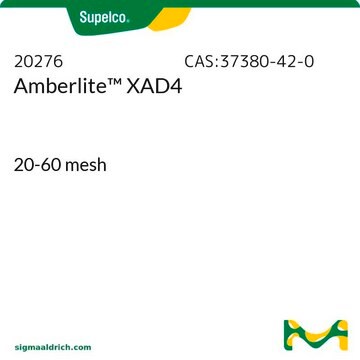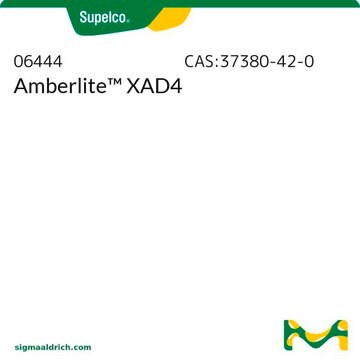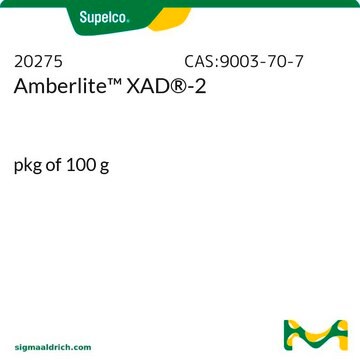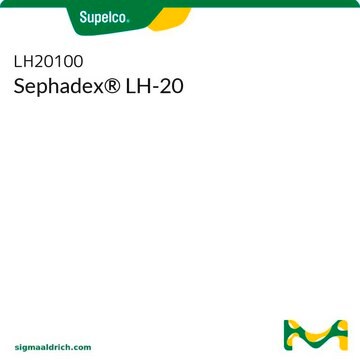Recommended Products
Product Name
Amberlite™ XAD4, 20-60 mesh
form
beads
Quality Level
autoignition temp.
800 °F
technique(s)
LPLC: suitable
surface area
750 m2/g
matrix
styrene-divinylbenzene
matrix active group
polymer
particle size
20-60 mesh
pore size
~0.98 mL/g pore volume
100 Å mean pore size
density
1.02 g/mL (true wet)(lit.)
1.08 g/mL (skeletal)(lit.)
separation technique
reversed phase
Looking for similar products? Visit Product Comparison Guide
General description
Nonionic macroreticular resin that adsorbs and releases ionic species through hydrophobic and polar interactions; usually used under isocratic conditions.
Application
Polyaromatic adsorbent for small hydrophobic compounds, surfactants, pharmaceutical manufacturing, phenols, chlorinated organics, pesticide removal and recovery, and organic removal from aqueous food streams.
Other Notes
Hydrophobic polyaromatic resin
Two particle sizes are available:
Mesh 20-60 are Cat. Nos. 20276, 10358, XAD4
Mesh 20-50 is Cat. No. 06444
Mesh 20-60 are Cat. Nos. 20276, 10358, XAD4
Mesh 20-50 is Cat. No. 06444
Legal Information
Amberlite is a trademark of DuPont de Nemours, Inc.
Storage Class Code
11 - Combustible Solids
WGK
WGK 3
Flash Point(F)
Not applicable
Flash Point(C)
Not applicable
Personal Protective Equipment
dust mask type N95 (US), Eyeshields, Gloves
Choose from one of the most recent versions:
Already Own This Product?
Find documentation for the products that you have recently purchased in the Document Library.
Marlen Kücklich et al.
PloS one, 12(8), e0183440-e0183440 (2017-08-26)
Previous studies showed that olfactory cues are important for mammalian communication. However, many specific compounds that convey information between conspecifics are still unknown. To understand mechanisms and functions of olfactory cues, olfactory signals such as volatile compounds emitted from individuals
Osman Çaylak et al.
Food chemistry, 274, 487-493 (2018-10-31)
An aminated Amberlite XAD-resin as a solid phase extractant was tested for speciation of inorganic mercury, Hg(II) and methylmercury, MeHg(I) in water and fish tissue samples. It was found that Hg(II) and MeHg(I) ions could be simultaneously retained by a
Joanne Sh Tan et al.
Applied microbiology and biotechnology, 101(13), 5427-5437 (2017-05-10)
Ginsenosides are believed to be the principal components behind the pharmacological actions of ginseng, and their bioactive properties are closely related to the type, position, and number of sugar moieties attached to the aglycone; thus, modification of the sugar chains
ZhiRong Liu et al.
The journal of maternal-fetal & neonatal medicine : the official journal of the European Association of Perinatal Medicine, the Federation of Asia and Oceania Perinatal Societies, the International Society of Perinatal Obstetricians, 33(4), 693-705 (2018-10-26)
Introduction: We carried out a systematic review and meta-analysis to assess the safety and effectiveness of uterine artery embolization (UAE) compared with conventional hysterectomy on refractory postpartum hemorrhage (PPH).Methods: We searched PubMed, Embase, Chinese National Knowledge Infrastructure database (CNKI), Cochrane
Mariafrancesca Scalise et al.
International journal of molecular sciences, 19(3) (2018-03-03)
The human plasma membrane transporter ASCT2 is responsible for mediating Na- dependent antiport of neutral amino acids. New insights into structure/function relationships were unveiled by a combined approach of recombinant over-expression, site-directed mutagenesis, transport assays in proteoliposomes and bioinformatics. WT
Our team of scientists has experience in all areas of research including Life Science, Material Science, Chemical Synthesis, Chromatography, Analytical and many others.
Contact Technical Service